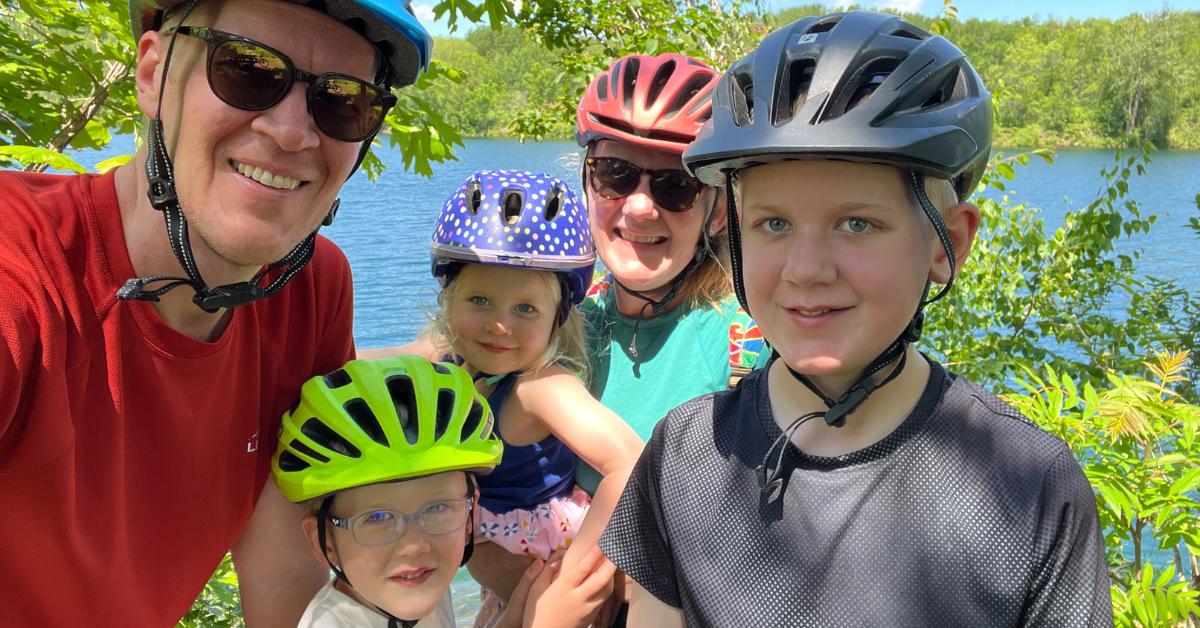
Tell me a little about yourself before your career in public health.
“I am originally from Hutchinson, MN. I love music and expressed that a lot growing up, playing trumpet in my high school’s band and singing in our choir. I also played a variety of sports, like football and tennis. But what I really enjoyed was collecting baseball cards — a hobby that I started when I was a kid and now do with my kids. My signed Cal Ripken Jr. card is my favorite, though I treasure my collection of Twins cards, too. I also love going to the MN State Fair and sharing some pronto pups with my family!”
What inspired you to become an educator?
“My parents were both teachers, so the value of education was instilled in me from childhood. It influenced my decision to pursue a career that would allow me to teach. I studied mathematics during my undergraduate studies at St. Olaf College, then worked at the Mayo Clinic doing statistical programming. After a few years, I decided to pursue my PhD in industrial engineering and operations research at North Carolina State University.”

How did your engineering and operations research background lead you to public health?
“I have always been interested in applying operations research (OR) methods to health care delivery settings. To do that type of applied work requires strong collaborations with health professionals and other disciplines. SPH has been ideal because it is a very multidisciplinary environment and is surrounded by large, innovative health systems. I think that is a great place to do the type of work I am interested in and to be able to do it in a collaborative way with colleagues from different academic backgrounds.”
Tell me about your research.
“I apply OR methods to different healthcare settings. It often means trying to make sure the right people and resources are in the right place at the right time. For example, an area I have focused a lot of attention on the past few years is the management of operating rooms and surgical suites. It is a complex planning environment because you have highly trained people, expensive resources and spaces, and patients with very different needs all coming together for specific procedures. It takes a lot of planning to ensure patients aren’t waiting for long, that surgical teams have timely access to the space and resources they need, and that organizations are not over capacity. In addition, you have a lot of uncertainty about how long cases can last. So, it is a very complex system. As part of my research, we have developed scheduling and capacity management algorithms in collaboration with health systems to improve how these care settings are managed.”
Do you teach any courses related to OR?
“Yes — I teach Operations Research in Healthcare for both the residential and executive tracks of our MHA program. My research focus and teaching have really been intertwined. I try to bring in my own research where appropriate, and certainly research projects where students have been significantly involved. And it goes the other way, too. Students have asked great questions in class that have later become topics for research papers.”
How would others describe your teaching style?
“My teaching style is rooted in active learning methods. This means breaking larger topics into smaller portions where students interact with the material along the way. That can be in the form of reflective exercises, peer-to-peer explanations, group analysis exercises, summarizing activities, and more. If I am lecturing for more than 10-15 minutes at a time, things aren’t going as planned.”
What is your favorite part about working with students? What programs have you worked on with students?
“My favorite part must be the questions that are raised in and outside of class. We can be discussing a topic that I have taught for years, and suddenly a student will ask a question that hasn’t been asked before that brings an entirely fresh perspective to the topic. I think it is illustrative of the enthusiasm for learning that the students bring into the classroom.”

What is something about you that might surprise your colleagues or students?
“I am really into birds. Sometimes my family or friends and I will go for walks and hikes just to count how many different bird species we hear or see. My family and I were on the north shore of Minnesota this summer and were able to spot a lot of raptors – hawks, falcons, kestrels, and eagles. That was fun, but the variety of birds in the backyard can be just as interesting to watch, too.”

